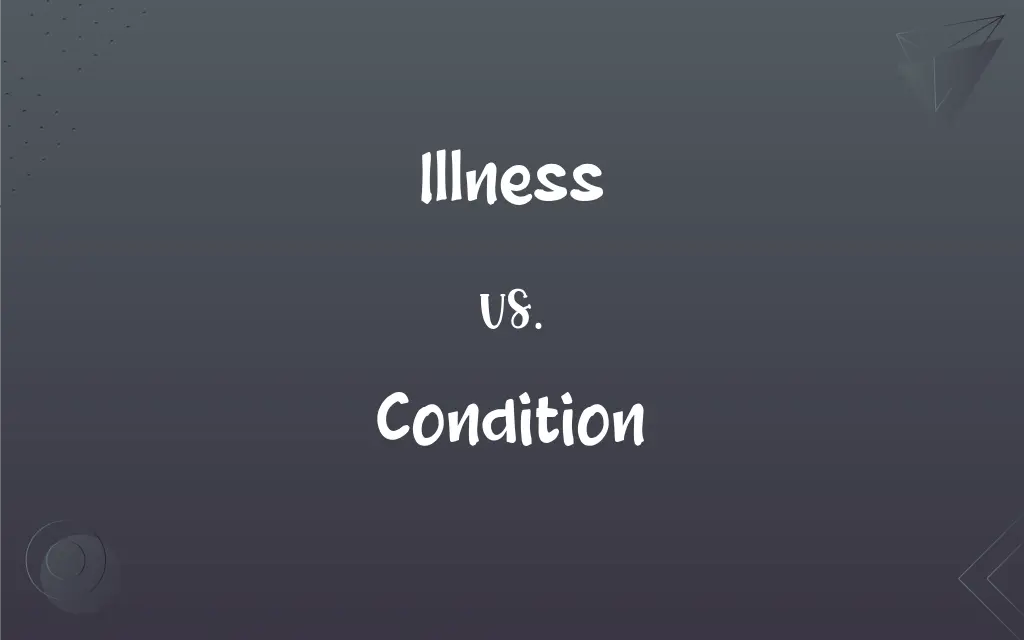Illness vs. Condition: What's the Difference?
Edited by Aimie Carlson || By Harlon Moss || Updated on November 2, 2023
Illness refers to a state of poor health affecting the body or mind, while a condition is a broader term including chronic illnesses, disorders, and other medical states.

Key Differences
Illness is typically used to denote being in a state of poor health, often caused by disease or infection. It is usually associated with discernible symptoms and signs, and can be acute or chronic. Condition, however, is a more general term that may refer to any particular state of health, whether it is an acute illness, a chronic disorder, or even a temporary state of being.
While an illness can lead to a diagnosis, which defines the specific nature of the problem, a condition may not always be due to illness. For instance, pregnancy is considered a condition, but it is not an illness. Conditions can be innate, such as color blindness, which while permanent, is not an illness that has developed or been contracted.
Treatment is commonly sought for illnesses, with the aim being to cure or manage symptoms. Conversely, some conditions may not require treatment; instead, they might just be states that individuals live with, such as a benign skin condition. Even though some conditions can include illnesses, not all do.
Illnesses often imply a departure from a previous state of good health and can impact one’s daily functioning. Conditions might not have this implication and can encompass a wider range of health issues, including lifelong disorders or anomalies, without necessarily suggesting a change in health status.
The term illness often conveys a need for medical intervention to restore health, while a condition might simply describe an individual's particular state that does not always require medical treatment. For example, high blood pressure is a condition that may be managed, but not necessarily considered an illness.
ADVERTISEMENT
Comparison Chart
Definition
A disease or period of sickness affecting the body or mind.
A specific state of health, which may or may not denote disease.
Duration
Can be temporary or chronic.
Can be permanent, chronic, or temporary.
Implication
Implies a need for treatment or intervention.
May not necessarily require treatment.
Scope
Generally refers to diseases or infections.
Includes diseases, disorders, disabilities, and non-disease states.
Examples
Flu, pneumonia, cancer.
High blood pressure, diabetes, pregnancy, cerebral palsy.
ADVERTISEMENT
Illness and Condition Definitions
Illness
An instance of poor health.
His illness was caused by a bacterial infection.
Condition
A specific state of health, whether normal or not.
Her condition was stable after the surgery.
Illness
A disease or period of sickness affecting the body or mind.
She took a week off work due to an illness.
Condition
A particular health problem or disease.
She was born with a rare skin condition.
Illness
A condition of being unwell.
Illness prevented him from attending the conference.
Condition
A circumstance or factor that affects the way you live.
His condition means he can't eat gluten.
Illness
A specific ailment with symptoms.
The doctors finally diagnosed her mysterious illness.
Condition
An ongoing state of health requiring management.
He lives with a heart condition.
Illness
An abnormal state that disrupts normal bodily functions.
The widespread illness prompted a health advisory.
Condition
The state of something with regard to its appearance, quality, or working order.
The car was in excellent condition.
Illness
Poor health resulting from disease of body or mind; sickness.
Condition
A mode or state of being
We bought a used boat in excellent condition.
Illness
A disease.
Condition
Conditions Existing circumstances
Economic conditions have improved. The news reported the latest weather conditions.
FAQs
Is diabetes an illness or a condition?
Diabetes is typically referred to as a condition due to its chronic nature.
Can chronic illnesses be cured?
Some chronic illnesses can be managed but not cured.
Are all conditions diagnosed by a doctor?
Most conditions are diagnosed by healthcare providers, but some can be self-recognized.
Can an illness be psychological?
Yes, illnesses can be psychological, such as depression or anxiety.
Does treatment differ for illnesses and conditions?
Yes, treatment can differ, as illnesses often aim for cure while conditions may focus on management.
Are all illnesses medical emergencies?
No, not all illnesses are emergencies; some may be mild and self-limiting.
Is asthma an illness or a condition?
Asthma is typically classified as a chronic condition due to its persistent nature.
Can someone be born with an illness?
Generally, illnesses are acquired, but some conditions, like congenital diseases, are present at birth.
Are the terms illness and condition interchangeable?
They can be used interchangeably in some contexts, but they have distinct meanings.
Is a cold an illness or a condition?
A cold is typically considered an illness since it is a temporary state of poor health.
Is every condition considered an illness?
No, not every condition is considered an illness; some conditions are not related to sickness.
Can an illness turn into a condition?
Yes, if an illness becomes chronic, it is often then referred to as a condition.
Are mental health issues considered illnesses or conditions?
They can be referred to as either, depending on whether they are temporary or chronic.
Can conditions be contagious?
Conditions that are illnesses can be contagious, but many conditions are not.
Are conditions always physical?
No, conditions can also be psychological or emotional.
Is high blood pressure an illness?
High blood pressure is more often referred to as a condition, particularly when it is chronic.
Can one person have multiple conditions?
Yes, an individual can have more than one condition at the same time.
Is a genetic disorder an illness?
Genetic disorders are usually referred to as conditions because they are inherent, not acquired.
Is cancer an illness or a condition?
Cancer is generally referred to as an illness due to its nature of abnormal cell growth.
Can lifestyle changes improve chronic conditions?
Yes, lifestyle changes can significantly improve some chronic conditions.
About Author
Written by
Harlon MossHarlon is a seasoned quality moderator and accomplished content writer for Difference Wiki. An alumnus of the prestigious University of California, he earned his degree in Computer Science. Leveraging his academic background, Harlon brings a meticulous and informed perspective to his work, ensuring content accuracy and excellence.
Edited by
Aimie CarlsonAimie Carlson, holding a master's degree in English literature, is a fervent English language enthusiast. She lends her writing talents to Difference Wiki, a prominent website that specializes in comparisons, offering readers insightful analyses that both captivate and inform.































































